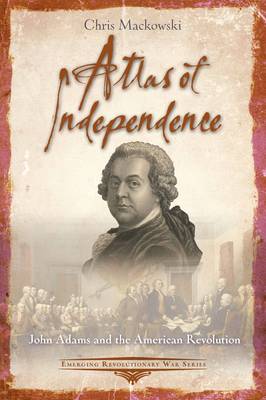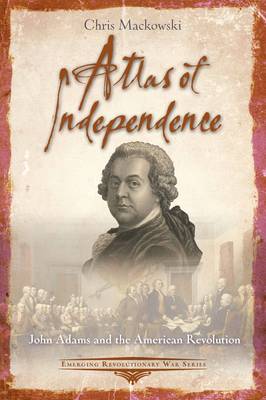
Bedankt voor het vertrouwen het afgelopen jaar! Om jou te bedanken bieden we GRATIS verzending (in België) aan op alles gedurende de hele maand januari.
- Afhalen na 1 uur in een winkel met voorraad
- In januari gratis thuislevering in België
- Ruim aanbod met 7 miljoen producten
Bedankt voor het vertrouwen het afgelopen jaar! Om jou te bedanken bieden we GRATIS verzending (in België) aan op alles gedurende de hele maand januari.
- Afhalen na 1 uur in een winkel met voorraad
- In januari gratis thuislevering in België
- Ruim aanbod met 7 miljoen producten
Zoeken
Omschrijving
"The man to whom the country is most indebted for the great measure of independence is Mr. John Adams. . . . I call him the Atlas of American independence."
So attested one of the delegates to the Second Continental Congress, moved to support Independence after months of angst, indecision, dithering, and fear. Thomas Jefferson called Adams "our colossus on the floor," arguing with power, passion, and persuasive force of reason why America needed to take the extraordinary step to break from the British Empire and set up an independent nation.
Born of humble means outside Boston, Massachusetts, Adams's work ethic led him to become one of the colony's most successful attorneys. Yet he burned with a powerful ambition and yearned for more. "I never shall shine, till some animating Occasion calls forth all my Powers," he fretted.
Festering tension in Boston with British soldiers and taxation and trade policies--tension that spread across all thirteen colonies--provided the occasion Adams longed for, and soon he found himself at the center of the storm, thrust onto the national stage where all his "Powers" transformed him into the intellectual architect of American independence. Perhaps more than any other American, he rose to the historical moment, urging his contemporaries into the unknown future.
But his efforts came at tremendous cost: long separations from his beloved children and "dearest friend" and wife, Abigail, who forged for herself a role as long-distance political counsellor even as she managed affairs on the family farm in a way nearly unprecedented for 18th Century America.
"The times alone have destined me to fame," Adams wrote. Atlas of Independence: John Adams and the American Revolution by Chris Mackowski offers a reader-friendly overview of Adams's seminal role in that tumultuous Founding time.
So attested one of the delegates to the Second Continental Congress, moved to support Independence after months of angst, indecision, dithering, and fear. Thomas Jefferson called Adams "our colossus on the floor," arguing with power, passion, and persuasive force of reason why America needed to take the extraordinary step to break from the British Empire and set up an independent nation.
Born of humble means outside Boston, Massachusetts, Adams's work ethic led him to become one of the colony's most successful attorneys. Yet he burned with a powerful ambition and yearned for more. "I never shall shine, till some animating Occasion calls forth all my Powers," he fretted.
Festering tension in Boston with British soldiers and taxation and trade policies--tension that spread across all thirteen colonies--provided the occasion Adams longed for, and soon he found himself at the center of the storm, thrust onto the national stage where all his "Powers" transformed him into the intellectual architect of American independence. Perhaps more than any other American, he rose to the historical moment, urging his contemporaries into the unknown future.
But his efforts came at tremendous cost: long separations from his beloved children and "dearest friend" and wife, Abigail, who forged for herself a role as long-distance political counsellor even as she managed affairs on the family farm in a way nearly unprecedented for 18th Century America.
"The times alone have destined me to fame," Adams wrote. Atlas of Independence: John Adams and the American Revolution by Chris Mackowski offers a reader-friendly overview of Adams's seminal role in that tumultuous Founding time.
Specificaties
Betrokkenen
- Auteur(s):
- Uitgeverij:
Inhoud
- Aantal bladzijden:
- 192
- Taal:
- Engels
- Reeks:
Eigenschappen
- Productcode (EAN):
- 9781611217810
- Verschijningsdatum:
- 15/02/2026
- Uitvoering:
- Paperback
- Formaat:
- Trade paperback (VS)
- Afmetingen:
- 152 mm x 229 mm

Alleen bij Standaard Boekhandel
+ 47 punten op je klantenkaart van Standaard Boekhandel
Beoordelingen
We publiceren alleen reviews die voldoen aan de voorwaarden voor reviews. Bekijk onze voorwaarden voor reviews.









